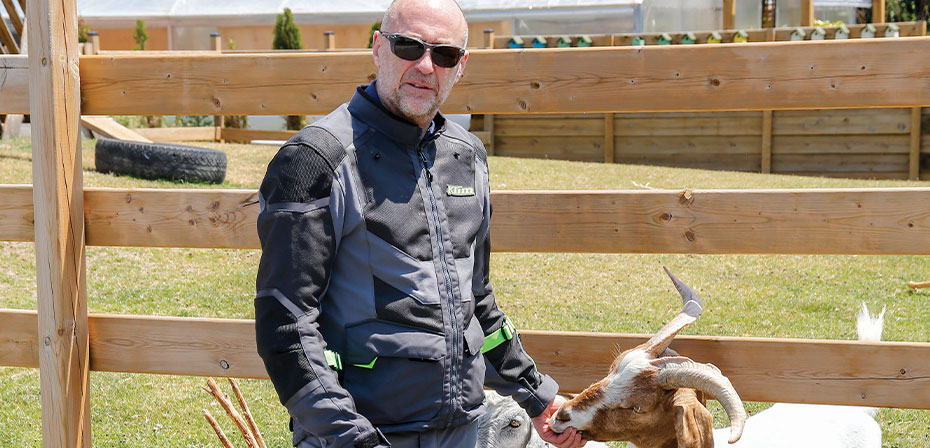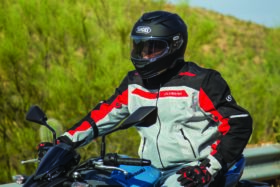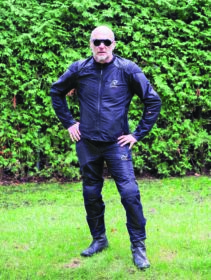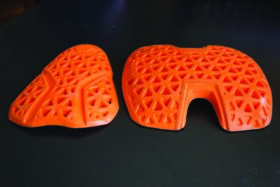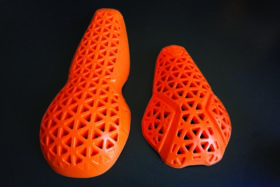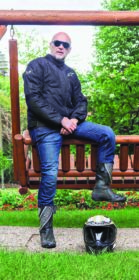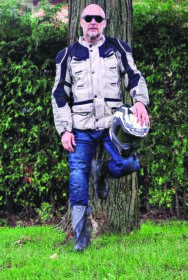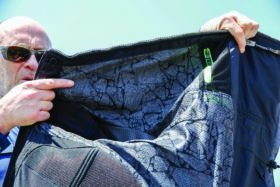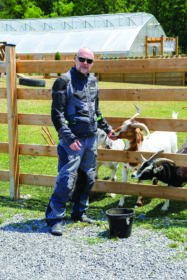Lack of airflow on a stinking hot day can ruin a perfectly good ride.
By the time you read this, 2021’s incredible heatwave will be (hopefully) over. Like pretty much everyone, motorcyclists have had to find ways to cope with heat that threatens to melt roads and minds. And, judging by the riders I saw out and about, the most common method most bikers used to combat the dog days of summer was to ride around in T-shirts and jeans. ATGATT — all the gear, all the time — sounds like such a good idea when some insurance actuary starts reeling off motorcycle mortality statistics, but all the airbags and D3O non-Newtonian fluids in the world aren’t worth their CE ratings if they’re at home in the closet because you don’t want to ride around in a sauna.
And yet, ironically, the best time to test hot weather is actually when it’s cold out. Truth be told, though a ventilated jacket — or any, ventilated gear, for that matter — is only truly useful when it’s warm, if you want to test which ventilated jacket really allows the most airflow, nothing works like an early-morning spring chill.
Let me assure you — because that’s how I started my test — nothing will give you a better inter-garment airflow comparison than ratcheting up the throttle to 100 km/h in a six-degree chill while wearing a jacket full of holes. So, in what would seem like the weirdest contradiction in the history of motorcycle accessory testing — especially, again, considering this summer’s record-breaking heat — I spent a lot of time riding around in low temperatures in warm-weather riding gear. This is what I figured out, including my maximum temperature limit in each suit:
Klim Baja S4
If maximizing ventilation is your main priority, then it’s going to be very hard to beat Klim’s Baja S4 jacket/pant combination. Almost three-quarters of its outer shell is Schoeller’s Dynatec High Tenacity Mesh. The only parts that don’t offer ventilation are the impact areas (knees, butt, shoulders and elbows) which are covered by some tough-wearing Superfabric.
 The Dynatec material really does flow incredibly well; it is seemingly the most porous of the mesh fabrics I’ve tested. It’s quite incredible how much air passes through the entirety of the Baja suit, with the pants alone passing so much air that it almost feels like you’re wearing shorts (at least that’s what it felt like riding around on a barely-above freezing April morning).
The Dynatec material really does flow incredibly well; it is seemingly the most porous of the mesh fabrics I’ve tested. It’s quite incredible how much air passes through the entirety of the Baja suit, with the pants alone passing so much air that it almost feels like you’re wearing shorts (at least that’s what it felt like riding around on a barely-above freezing April morning).
Neither the S4 jacket or pants sacrifice much protection in their quest for airflow. Like I said, all the impact areas are layered in Superfabric — a layer of “armour plates” resting on a base cloth — and it is very abrasion-resistant. The S4 also has a full complement of D3O armour, the pants featuring knee (common) and hip (not as common in ventilated gear as it should be) CE Level 1 protection while the jacket has elbow, shoulder and back D3O pads — again, all CE approved — giving the S4 an AA overall CE rating.
It’s also worth noting that the protectors are available from Klim in a thicker Level II D3O version. I’ve already upgraded to the Level II protectors at the hips and knees and, while they do feel bulkier while walking around, on the bike there’s barely any discernible difference in comfort.
To protect you from the elements, however — and with such porosity, the S4 really does need protection when the elements get nasty — Klim has a purpose-built two-piece rain suit that is exclusive to the Baja. Constructed of a stretchable Schoeller material, the Enduro S4 suit is completely impervious to even the most torrential of downpours.
Just as importantly, if said downpour is a sudden squall, the rain suit is extremely easy to put on — the pants zippered both from the hem and the waist, making slipping into the suit quick and simple.
The combination of Baja S4 vented suit and Enduro rain suit is truly primo gear. And, making the Enduro system even more marketable is the fact that they are sized to fit the corresponding Baja garment. If you take a large S4 vented jacket, simply order a large Enduro jacket.
The only problem is that quality doesn’t come cheap. Oh, the basic Baja S4 suit is reasonable enough: the jacket retails for $750 and the pants sell for $600, for a total of $1,350. But the Enduro jacket and pant rain suit combination, at $780, costs almost as much as many basic pant-jacket combos. And, if you opt to upgrade all of the armour to Level II, you’re looking at more than two grand for the whole kit and caboodle.
Klim’s other issue is that its biggest strength is also its singular performance flaw. It flows so much air that, even in moderate temperatures, things can get a little chilly. And since it’s all mesh, the only way to restrict airflow is to don the aforementioned rain suit. Unfortunately, that’s a little like having an on/off switch for an air conditioning system. At, say, 16 degrees C, your only choices are to suck it up and risk a little chill, or don the rain suit and sweat a little. The Baja’s airflow is prodigious, but there’s no way of moderating it.
DAVID BOOTH’S maximum temperature index before melting: 38°
Rukka StretchAir
Like the Klim Baja suit, Rukka also offers its StretchAir system as a pant/jacket combination. That’s pretty much where any similarities end. Unlike the Baja suit, which (unsurprisingly) has an adventure cut, the StretchAir offers a sports-oriented feel, with styling very similar to a two-piece leather racing suit. In fact, the Rukka jacket and pants can be zipped together, thanks to an attachment system that goes around almost the entire waist area. The combination actually feels more natural when zipped together.
Unlike virtually every other vented garment I’ve seen — including the Klim ones above — the StretchAir is not constructed of a combination of mesh in non-critical areas and tougher, abrasion-resistant materials, usually Cordura, on expected impact areas. Instead, both jacket and pants are constructed completely of Cordura AFT (as in Air Flow Technology),
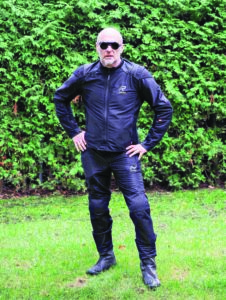
with the impact areas simply getting a double layer.
Despite being made entirely of vented material, the StretchAir garments don’t allow as much cooling airflow as the Klim system, simply because the Cordura weave is much tighter than Klim’s Schoeller mesh. It’s still much cooler-riding than an equivalent leather or non-mesh textile garment, but for sheer ventilation, the Rukka system is not in the same league as the Klim.
Where Rukka excels is in protection — or, more accurately, impact resistance. Simply put, there’s more D3O thermoplastic polyurethane in Rukka’s StretchAir than in any other street suit I’ve ever tested. Hell, there’s more armour in the Rukka pants than most racing suits. Not only is all the XTR armour of the thicker Level II variety, but each piece of armour covers vastly more area than pretty much any competitive padding I’ve tried. The jacket’s elbow armour and the pant’s knee protectors are absolutely immense, the latter not only covering the knee but most of the shin as well, and there has to be at least three times the amount of D3O thermoplastic polyurethane in a Rukka hip protector than many competing pants.
Actually, I was wrong: there are two more similarities to Klim outerwear. First, like the Baja suit, the Rukka comes with excellent rainproof overgear; second, also like the American brand, the Finnish gear isn’t cheap. The jacket and pants combine for $1,125 and, by the time you throw in the Gore-Tex StretchDry rainsuit, you won’t get much change from two grand. Also like the Klim, there’s no way to regulate the StretchAir’s airflow. Either you get maximum ventilation, or you shut it all down; there’s no in between.
DAVID BOOTH’S maximum temperature index before melting: 32°
Dainese D-Explorer
Regulation of airflow, meanwhile, is the Dainese D-Explorer’s raison d’être. One of the few true four-seasons jackets out there, where most adventure style textile jackets rely on (mostly ineffective) zippered vents to cool the wearer down, the D-Explorer uses the same style of porous fabric as traditional mesh jackets, only it covers them with modular flaps.
Two such flaps cover most of the front of the jacket. There’s also a huge vented area covering the entire back protector area, and a zipper along both sleeves which opens up a vent that runs the full length of the arm. The accompanying pants also have a large vented area in the upper thigh area, just below the pockets. Open all the jacket’s vents and the airflow is just about comparab
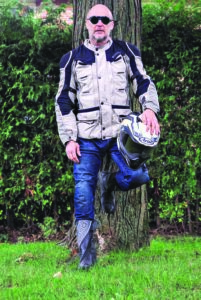
le to the Rukka and trails the Klim by about 10 or 15 per cent (that’s according to my completely subjective “I’m-f’ing-freezing-out-here-wearing-vented-motorcycle-gear-at-6-degrees” index).
But maximum airflow is not the D-Explorer’s killer app. Nope, what makes Dainese’s jacket (and to a lesser degree, the pants) unique is that each of those modular flaps can be tailored to regulate airflow. A scorching day sees all flaps at maximum aperture but, as the sun sets (and temperatures drop), a quick tug of a few zippers reduces ventilation as necessary. And, when things get chillier, you can close the flaps entirely, and add both a Gore-Tex rainproof layer and/or a Thinsulate vest. The D-Explorer is perfectly suitable for any temperature from 5 to 40 C — or even lower if you, as I do, pair it with a heated vest instead of the Thinsulate one.
As for protection, first-gen D-Explorers like my own have elbow, shoulder, knee and back protectors, all certified to Level I, as well as abrasion-resistant fabric on all the impact zones. The second-generation version introduced last year ups that to Level II protectors, which are also ventilated, while also incorporating Trixior D-TEC abrasion-resistant material on the shoulders, elbows and knees. Better yet, the second gen jacket is actually cheaper by about $100 than the US$899 I paid five years ago.
Nothing’s perfect, however, and the D-Explorer has two faults. First off, the trousers come with no hip protectors, nor are there pockets to accommodate anything you might like to add. For that reason, while I whole-heartedly recommend the D-Explorer jacket, I’m less enthusiastic about the pants. Second, the compromise that allowed Dainese to reduce the jacket’s price is that they have combined the rain and insulating layers, which means things are going to get plenty toasty if it rains on a hot summer day. Considering that the D-Explorers’ entire raison d’être is versatility, this is a little disappointing.
DAVID BOOTH’S maximum temperature index before melting: 33
Olympia Airglide
Olympia basically invented the three-layer multi-season jacket with its Airglide and, all these years later, it’s still the go-to jacket for those looking for versatility on a budget. Indeed, despite my protestations that I’d happily buy her a new jacket, my significant other swears by her now eight-year-old Airglide. Oh, I’ve upgraded the armour in every pocket (early Olympia armour resembled nothing more than a bunch of Styrofoam packing chips melded into the shape of an elbow or knee), but she loves the cut and breathability.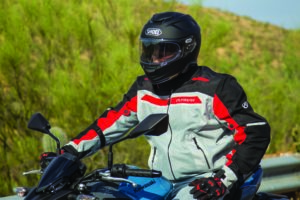
Essentially the entire jacket, except for the Cordura-reinforced impact areas, is mesh. If the temperature drops (or it rains), she zips the inner rain suit and, when things get really nasty, she zips the insulated vest into the rain layer. I’ve had two such three-layer Olympia jackets myself. and they’re the best bang-for-your-buck to be had in the multi-season segment.
That’s even more true now that, in its 6th generation, the $470 Airglide now sports modern Level II Powertector Hex-Pro armour in all the impact areas. The three-layer design persists — shame on you Dainese — but, in the interest of even more versatility, the rain layer can now be worn inside or outside the jacket. We’ve tried it and, in one of those (tragically) rare examples of spousal accord, we both agree that we like the older, inner-only system. Olympia makes matching pants ($330), but we’ve made far less use of them than the jacket.
DAVID BOOTH’S maximum temperature index before melting: 35°
Alpinestars Tailwind Tech-Air Compatible
 All of the preceding gear has relied on passive armour, and all now offer Level II armour (the Klim suit as an option, of course). The Rukka is especially overwhelming in how much D3O it manages to stuff into one suit.
All of the preceding gear has relied on passive armour, and all now offer Level II armour (the Klim suit as an option, of course). The Rukka is especially overwhelming in how much D3O it manages to stuff into one suit.
That said, no amount of passive armour will ever match the protection offered by an airbag, and while many companies are now offering stand-alone inflatable vests that can be worn with a ventilated jacket, Alpinestars, Helite and Dainese offer vented textile jackets that specifically incorporate an airbag.
Of the two that are mated with electronically-controlled air bags (the Helite uses a tether cord), I’ve only tested the Alpinestars version. The Tailwind replaces the discontinued Viper (which I’ve reported on previously) and features more of an adventure-touring cut, a much more effective rainproof layer (which add to its versatility in terms of both warmth and waterproofing) and appreciably more venting. As air bag systems go, it’s one of the cooler-running garments, if not the most frigid. That said, the air bag itself blocks much of the airflow directed at the chest, leaving the venting in the arms and shoulders to supply the bulk of the wicking effect. Hence the reason it scores lowest on my ventilation index.
The Tailwind, like the Klim jacket, only comes with Level I armour at the elbows and shoulders and, unlike the Viper it replaces, you can’t upgrade it to Level II. That said, Alpinestars Tech-Air system provides excellent clavicle protection, which mitigates the concern over shoulder safety. Furthermore, despite being rated for lesser protection, the Tailwind’s elbow pads are huge, covering more of the forearm area than any of the armour (save Rukka’s D3O XTR).
And the Tech-Air system does offer a versatility of a sort. Unlike Dainese’s stand-alone inflatable gear, Alpinestars’ air bags are swappable between jackets. I use the Tailwind during the heat of summer, then switch the airbag over to the Tech-Air Compatible Revenant for the spring and fall. All that versatility comes at a price, however: the best price I’ve seen for the Tailwind and Tech-Air bag combo is around $1,350. Throw in the aforementioned Revenant for full four-
season capability and you won’t see much change from two and a half grand. That said, you’ll be very well-protected.
DAVID BOOTH’S maximum temperature index before melting: 29°
Conclusion
So, where does that leave us? What is the best jacket/suit when climate change rears its ugly head? Well that, of course, depends on what your priorities are. If…
You want maximum ventilation, nothing touches the Klim Baja S4. If the climate really does get serious about changing, I suspect this will be the most popular summer riding suit in motorcycling. Yes, it’s expensive (especially when you add the rain suit and D3O upgrades) and, of course, the sheer volume of air it moves compromises its cold weather performance. But when the mercury is heading for 40, there’s nothing more comfortable.
You want maximum ventilation from a two-piece sporty riding suit, Rukka’s StretchAir is essentially a zip-together two-piece riding suit made of Air Flow Technology Cordura instead of leather. It fits tight, has by far the most comprehensive passive armour and will still flow a goodly amount of air. It’s also quite fashionable, receiving a surprising number of compliments from non-bikers.
You want maximum ventilation for minimum money, Olympia’s Airglide is still a great buy; all the more so since they’ve upgraded to Level II armour. Olympia also has a new Expedition jacket that offers flap-covered mesh, much like D-Explorer (though the venting areas are smaller). I have not tested it yet but am hoping to convince she-who-refuses-to-upgrade that it might be an excellent evolution of her obsession with Olympia.
You want maximum impact protection from a ventilated pant/jacket combination, may I suggest you mix and match the Alpinstars Tailwind jacket with the Rukka StretchAir pants? Not only do the colours match — their respective black hues are almost indistinguishable — but they have zippers so they can be zipped together for maximum protection (though they will have to be made compatible). And, thanks to the jacket’s airbag and those humongous D3O protectors in the Rukka pants, you’ll be well protected against things that go bump in the night.
You want truly versatile four-season protection, nothing beats Dainese’s D-Explorer. It flows as much air as any garment here save the Klim, but zip up all the panels and then add the Thinsulate layer — or, better yet, a heated vest — and you’ll be more afraid of icy roads than frost-bitten nether regions. If I can figure out how to zip the first generation’s separate liners into the second gen’s outer shell, I’ll be getting a new second-gen D-Explorer as soon as possible. Just the jacket that is; the pant’s lack of hip armour is a deal-breaker for me.
Author’s message: You’ll note that little mind was paid to the various comfort criteria for each of the garments tested here. For one thing, fit is a very personal affair. For another, the discussion of their relative airflow capabilities and impact protection already took up enough room in this issue.
Also, other than the Klim (for its immense airflow) and the Rukka (for its superlative impact protection), the ventilated pants that make up part of the suit combination of the products tested here were given short shrift. That’s because, with the advent of new single-layer Kevlar jeans — the Kevlar being woven into the fabric rather than requiring a separate, second layer — they’re generally a much better all-round solution than textile pants. Stay tuned for a round up on biking jeans soon.









